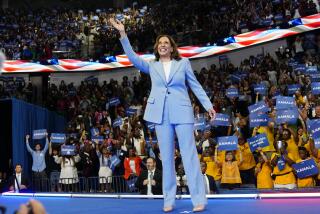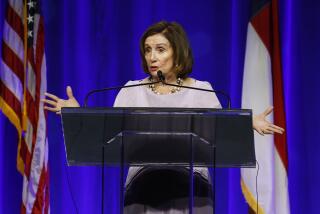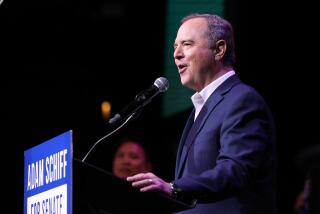NEWS ANALYSIS : Decision Puts GOP Contest in Sharper Focus
- Share via
WASHINGTON — Colin L. Powell’s decision not to seek the presidency--coming on the same day that Republican front-runner Bob Dole secured a key endorsement from the governor of New Hampshire--has refocused and potentially compressed the race for the GOP nomination.
The confluence of events creates a new opportunity for the nine relatively little-known figures chasing Dole--and suggests they have a limited window of time in which to press their claim.
With Powell, who had loomed over the field for weeks, removed from consideration, the battle to emerge as the alternative to Dole will now accelerate. The first major test will come next week when Florida Republicans gather for an elaborate straw poll that constitutes the most important electoral showdown for the candidates before actual voting begins with early February caucuses in Louisiana and, most importantly, Iowa.
The decision by New Hampshire Gov. Steve Merrill to endorse Dole raises the importance of these early skirmishes. That’s because if the other candidates cannot draw blood from Dole before New Hampshire’s Feb. 20 primary, some analysts believe the front-runner may be able to virtually sew up the campaign there.
With the threat from Powell removed, and Merrill on his bench, Dole may now be in a position analogous to that of a baseball team with an unhittable relief pitcher: He has not guaranteed victory, but he has reduced the number of realistic opportunities his foes have left to cut into his lead.
Several observers suggested Wednesday that the day’s events have dramatically increased the pressure on Dole’s rivals to defeat him or wound him with an unexpectedly strong showing in either next week’s Florida straw poll or the Feb. 12 Iowa caucuses.
“If somebody wants to stop Dole, they are going to have to do it in Iowa, because it looks like New Hampshire is coming together for him,” said Brian Kennedy, the GOP chairman in Iowa. “And if he takes Iowa and New Hampshire in stride, I don’t see how anyone catches him from that point.” Other campaigns are formulating strategies that would attempt to overcome Dole even if he succeeds in those two contests. They argue that once the field is winnowed--in all likelihood to Dole and a single opponent--Republicans will then reject the front-runner as lacking a message that can carry the party to victory.
“Dole can have as many endorsements as he wants, but if he doesn’t have a message, he is going to lose this race,” said Mark Merritt, communications director for Lamar Alexander’s presidential campaign.
Wednesday’s dramatic events promise to redirect the race in another respect: With Powell’s absence, the GOP will be spared a knock-down ideological struggle between moderate and conservative elements of the party. But his decision not to run could encourage the remaining contenders to one-up each other as the most conservative candidate--at a time when Tuesday’s off-year elections indicated some voters may be recoiling from the intensity of the “Republican revolution” in Washington.
Though only a handful of local offices were at stake, Tuesday’s results offered Democrats their most encouraging results since 1992. Republicans lost control of the state Senate in Maine, were unable to dislodge Democratic dominance of the Legislature in Mississippi and failed in a high-profile effort to capture the Virginia Legislature.
Ballot initiatives advancing key themes of the GOP revolution failed in Mississippi and Washington state. Mississippi became only the second state to reject a referendum to impose term limits on members of Congress. And in Washington state, voters resoundingly rejected a measure to require compensation to landowners whose property values are diminished by environmental or other government regulations.
The two gubernatorial races on Tuesday’s ballot sent a mixed message. While Republican Kirk Fordice won reelection in Mississippi, Democrat Paul Patton triumphed in Kentucky in a race both parties framed as a referendum on their national leadership.
On Wednesday, Republican National Committee Chairman Haley Barbour argued that the overall results were “something I’m certainly happy to settle for.” But Democrats crowed that the outcomes--particularly in the high-profile Kentucky contest--underscored signs of dissatisfaction with the GOP budget plan evident in recent public opinion polls.
“Kentucky was a good sign,” said one senior White House official, “particularly on the grounds it was waged [by Patton]: anti-[House Speaker] Newt [Gingrich] and anti-’contract with America.’ ”
Ordinarily, such election post-mortems and Merrill’s embrace of Dole would have consumed the political world Wednesday. But the announcement of Powell’s intentions overshadowed all else.
Though many admirers hoped Powell would run, few found the announcement surprising because during his weeks of contemplation, the retired general had taken few steps to build the political organization required to mount a race.
Moreover, several observers noted that past potential candidates--from former New York Gov. Mario M. Cuomo to former Defense Secretary Dick Cheney--who had been so conflicted about the race that they spent weeks carefully pondering their options almost never actually crossed the line.
With Powell’s long shadow removed, all of Dole’s remaining rivals insisted their prospects of emerging as the alternative to the front-runner have improved. Several suggested that the surge of interest in Powell underscores doubts about Dole’s strength as the GOP nominee--and argued that they will now be in a position to convert those anxieties to their own benefit.
“The tremendous appeal of Colin Powell had as much to do with dissatisfaction with Dole as it did with satisfaction with Powell,” said Merritt, the Alexander aide.
Disappointment over Powell’s decision among those dissatisfied with Dole could prompt renewed agitation for a late entry into the race by Gingrich, who continues to dangle the prospect of a candidacy most of his close allies consider extremely unlikely.
Gingrich kept the speculation alive Wednesday, saying that while the chance of his running is only about 10%, “it’s higher with Colin out than it would have been had he decided to run.”
Still, the combined effect of Powell’s decision and Merrill’s endorsement made it a day for the Dole campaign to celebrate.
“Between Powell and Merrill, I see this day as being essentially the entire Republican primary process,” said GOP political consultant David M. Carmen, who is not affiliated with any of the candidates. “This is the decisive moment.”
Few others would go that far--noting not only the inherent unpredictability of the nomination process but also Dole’s penchant for self-immolation in his earlier bids for the White House.
“Bob Dole still has to overcome Bob Dole,” said Kellyanne Fitzpatrick, a conservative Republican pollster critical of the front-runner.
But Fitzpatrick acknowledged that Wednesday’s dramatic set of events leaves Dole’s rivals with less time to make their case. “The window of opportunity is shorter now.”
Times staff writer Bob Sipchen contributed to this story from Manchester, N.H.
More to Read
Get the L.A. Times Politics newsletter
Deeply reported insights into legislation, politics and policy from Sacramento, Washington and beyond. In your inbox twice per week.
You may occasionally receive promotional content from the Los Angeles Times.










